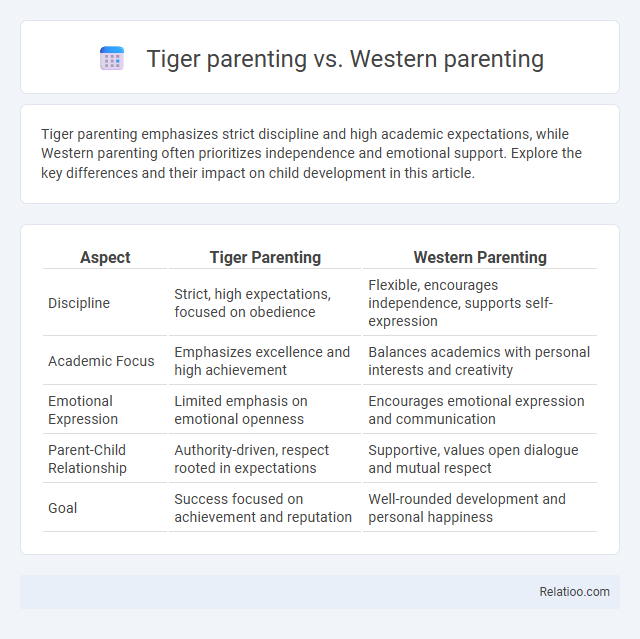Tiger parenting emphasizes strict discipline and high academic expectations, while Western parenting often prioritizes independence and emotional support. Explore the key differences and their impact on child development in this article.
Table of Comparison
| Aspect | Tiger Parenting | Western Parenting |
|---|---|---|
| Discipline | Strict, high expectations, focused on obedience | Flexible, encourages independence, supports self-expression |
| Academic Focus | Emphasizes excellence and high achievement | Balances academics with personal interests and creativity |
| Emotional Expression | Limited emphasis on emotional openness | Encourages emotional expression and communication |
| Parent-Child Relationship | Authority-driven, respect rooted in expectations | Supportive, values open dialogue and mutual respect |
| Goal | Success focused on achievement and reputation | Well-rounded development and personal happiness |
Introduction to Parenting Styles
Parenting styles shape children's development, with Tiger parenting emphasizing strict discipline and high academic expectations rooted in East Asian cultures. Western parenting typically encourages independence, open communication, and emotional expression, fostering creativity and self-confidence. Comparing Tiger parenting and Western parenting reveals diverse approaches to nurturing success and emotional wellbeing through cultural values and child-rearing techniques.
Defining Tiger Parenting
Tiger parenting emphasizes strict discipline, high academic expectations, and rigorous involvement in children's education to foster success. Western parenting prioritizes autonomy, emotional support, and balanced development, encouraging independence alongside academic achievement. Defining tiger parenting highlights an authoritative style characterized by high demands and low warmth, contrasting the typically more nurturing and flexible Western approach.
Characteristics of Western Parenting
Western parenting emphasizes fostering independence, creativity, and emotional expression in children through supportive communication and encouragement of individual interests. It prioritizes balanced discipline, promoting self-regulation and empathy rather than strict obedience or high-pressure academic achievement. This approach often includes collaborative decision-making within families and values open dialogue to nurture well-rounded personal development.
Core Values and Beliefs
Tiger parenting emphasizes strict discipline, high academic expectations, and obedience, rooted in collectivist values and a strong belief in perseverance and hard work. Western parenting prioritizes fostering independence, creativity, and emotional expression, reflecting individualistic cultural values that value self-confidence and personal growth. Your choice between these parenting styles can significantly impact your child's development based on how core beliefs about success, respect, and family roles are prioritized.
Academic Expectations and Achievement
Tiger parenting emphasizes rigorous academic expectations and often enforces strict study routines to ensure high achievement, focusing heavily on discipline and performance. Western parenting typically encourages a balanced approach, promoting academic success alongside creativity, critical thinking, and emotional well-being, allowing your child more autonomy in their educational journey. Compared to Western styles, Tiger parenting's high-pressure environment can lead to exceptional academic results but may also increase stress and reduce self-motivation in your child.
Discipline and Authority Approaches
Tiger parenting emphasizes strict discipline and high authority, often enforcing rigorous academic and behavioral standards through clear rules and firm consequences. Western parenting tends to adopt a more democratic approach, encouraging open communication, autonomy, and reasoning to guide children's behavior while maintaining boundaries. The hybrid model blends the strictness of tiger parenting with the flexibility and emotional support characteristic of Western parenting, aiming for balanced discipline that fosters both achievement and independence.
Emotional Support and Communication
Tiger parenting emphasizes strict discipline and high academic expectations, often prioritizing achievement over emotional expression, which may limit open communication. Western parenting tends to encourage emotional support and fosters open dialogue, promoting autonomy and self-expression in children. Your choice between these styles affects your child's emotional development and the quality of your communication, balancing discipline with empathy.
Impact on Child Development
Tiger parenting emphasizes strict discipline and high academic expectations, often leading to strong achievement but increased stress and anxiety in children. Western parenting tends to prioritize emotional well-being and independence, fostering creativity and self-esteem but sometimes at the expense of academic rigor. Combining tiger parenting's structure with Western parenting's support can balance academic success and healthy emotional development in children.
Cultural Influences on Parenting Styles
Cultural influences heavily shape parenting styles, with Tiger parenting emphasizing strict discipline and high academic expectations rooted in East Asian traditions, while Western parenting often values independence and emotional expression influenced by individualistic cultural norms. Tiger parenting prioritizes collective family success and respect for authority, reflecting Confucian values, whereas Western parenting encourages self-expression and autonomy aligned with Western democratic ideals. Understanding these cultural contexts can help you navigate and appreciate the diverse approaches to raising children across different societies.
Striking a Balance: Finding What Works
Striking a balance between Tiger parenting and Western parenting involves blending high expectations with emotional support to foster both discipline and independence. Your approach should emphasize strong academic encouragement while nurturing creativity and self-expression. Adapting strategies to fit your child's unique needs can create a harmonious environment that promotes success and well-being.

Infographic: Tiger parenting vs Western parenting
 relatioo.com
relatioo.com